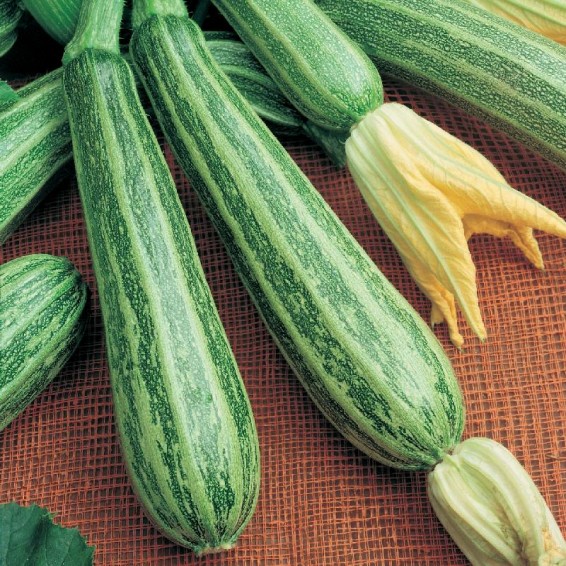Organic Cocozelle Summer Squash Seeds
- HOW TO GROW
- FAST FACTS
- REVIEWS
HOW TO GROW
Sowing: Gardeners with short growing seasons may want to start their squash seeds indoors a month before the last expected frost. Since squashes do not take well to transplanting, peat pots are the best option. Plant two seeds per pot, later clipping off the weaker seedling. Harden the seedlings by exposing them to the weather for several hours at a time during the week before transplanting. About a week after the last frost or when the soil temperature reaches an average of 65 degrees F, plant the seedlings in very rich soil 8-10' apart in rows 10-12' apart. Another option is to plant the seedlings in hills of two, 8-10' apart. To direct sow, plant the seeds when the soil temperature reaches at least 70 degrees F. Plant them 1/2" deep, 3-4' apart and thin to 8-10' apart. For companion planting benefits, plant squashes along with corn but avoid planting them with potatoes.
Growing: Since squash seedlings do not tolerate frost, provide protective coverings if the temperature drops below 65 degrees F. Keep the soil moist at all times, but avoid getting the leaves wet as this can cause diseases such as rot or mildew. When the vines begin to develop, a layer of mulch will help conserve moisture and control weeds; mulch also will keep the squashes clean and protect them from too much soil contact.
Harvesting: These squashes generally taste best when harvested at a length of 6-8". When the plant begins to produce mature squashes, they should be picked every day or two. Cocozelle squashes keep well in the refrigerator for about two weeks and freeze well.
Seed Saving: By the time the squash reaches its mature size, the seeds are mature. Cut the squash open, remove the pulp and seeds, and rinse off the pulp. Put the mixture in a bowl of water to remove the remaining pulp; the good seeds will sink. Remove the good seeds and spread them out to dry for 2-3 weeks, stirring them at times to make sure they dry completely. Store the seeds in a cool, dry place for up to 4 years.
FAST FACTS
Latin Name: Cucurbita pepo
Type: Open Pollinated, Heirloom, Warm Season
USDA Zones: 3, 4, 5, 6, 7, 8, 9, 10, 11, 12
Seeds per Ounce: 250
Planting Method: Direct Sow
Sunlight: Full Sun
Height: 24 Inches
Color: Green
Organic Cocozelle Summer Squash Seeds
Received my package in record time. All of the seeds are packaged in foil envelopes, looking all fresh and protected. Can't speak of the germination of the seeds because it's the end of November. If previously purchased and grown seeds from Everwilde Farms is any indication of the viability of my new seeds, we will have a prolific crop.
DESCRIPTION
HOW TO GROW
Sowing: Gardeners with short growing seasons may want to start their squash seeds indoors a month before the last expected frost. Since squashes do not take well to transplanting, peat pots are the best option. Plant two seeds per pot, later clipping off the weaker seedling. Harden the seedlings by exposing them to the weather for several hours at a time during the week before transplanting. About a week after the last frost or when the soil temperature reaches an average of 65 degrees F, plant the seedlings in very rich soil 8-10' apart in rows 10-12' apart. Another option is to plant the seedlings in hills of two, 8-10' apart. To direct sow, plant the seeds when the soil temperature reaches at least 70 degrees F. Plant them 1/2" deep, 3-4' apart and thin to 8-10' apart. For companion planting benefits, plant squashes along with corn but avoid planting them with potatoes.
Growing: Since squash seedlings do not tolerate frost, provide protective coverings if the temperature drops below 65 degrees F. Keep the soil moist at all times, but avoid getting the leaves wet as this can cause diseases such as rot or mildew. When the vines begin to develop, a layer of mulch will help conserve moisture and control weeds; mulch also will keep the squashes clean and protect them from too much soil contact.
Harvesting: These squashes generally taste best when harvested at a length of 6-8". When the plant begins to produce mature squashes, they should be picked every day or two. Cocozelle squashes keep well in the refrigerator for about two weeks and freeze well.
Seed Saving: By the time the squash reaches its mature size, the seeds are mature. Cut the squash open, remove the pulp and seeds, and rinse off the pulp. Put the mixture in a bowl of water to remove the remaining pulp; the good seeds will sink. Remove the good seeds and spread them out to dry for 2-3 weeks, stirring them at times to make sure they dry completely. Store the seeds in a cool, dry place for up to 4 years.
FAST FACTS
Latin Name: Cucurbita pepo
Type: Open Pollinated, Heirloom, Warm Season
USDA Zones: 3, 4, 5, 6, 7, 8, 9, 10, 11, 12
Seeds per Ounce: 250
Planting Method: Direct Sow
Sunlight: Full Sun
Height: 24 Inches
Color: Green
Reviews
Review
Organic Cocozelle Summer Squash Seeds
Received my package in record time. All of the seeds are packaged in foil envelopes, looking all fresh and protected. Can't speak of the germination of the seeds because it's the end of November. If previously purchased and grown seeds from Everwilde Farms is any indication of the viability of my new seeds, we will have a prolific crop.





